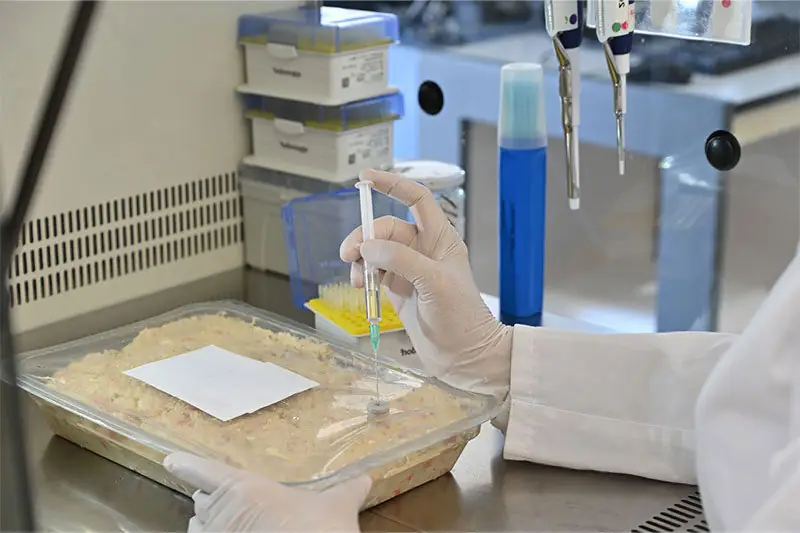Microbiological Risk Assessment in Cosmetic Production
The microbiological safety of cosmetics is a critical concern in the beauty and personal care industry. Microorganisms, including bacteria, fungi, and viruses, can pose significant risks if they find their way into cosmetic products. These risks range from minor skin irritation to severe infections and allergic reactions. Ensuring that the production environment meets strict hygiene standards is essential for mitigating these risks.
The microbiological risk assessment in cosmetic production involves several key steps. Initially, the manufacturing site must undergo a thorough cleaning and sterilization process, followed by regular monitoring to ensure that any potential contamination is addressed promptly. The use of advanced filtration systems and controlled environmental conditions further reduces the likelihood of microbial growth.
Sampling plays a crucial role in microbiological risk assessment. Samples are collected from various points within the production facility, including raw materials, packaging materials, processing equipment, and final products. These samples are then analyzed using sophisticated laboratory techniques to identify any presence of harmful microorganisms. The results of these tests provide valuable insights into the effectiveness of current hygiene protocols and inform necessary adjustments.
A successful microbiological risk assessment requires a comprehensive understanding of the potential hazards associated with each stage of cosmetic production. This includes evaluating the impact of raw materials, processing methods, and packaging on microbial contamination levels. By identifying high-risk areas early in the process, companies can implement targeted interventions to reduce risks throughout the supply chain.
International standards such as ISO 22716:2011 and USP General Chapter Monograph 1031 provide guidelines for microbiological testing in cosmetics. Compliance with these standards ensures that manufacturers adhere to best practices and meet regulatory requirements.
Microbiological risk assessment also involves ongoing monitoring of production processes. This continuous evaluation helps maintain a high level of hygiene across all stages, from raw material procurement to product dispatch. Regular audits and inspections further reinforce this commitment by ensuring that all personnel are trained in proper hygiene practices and adhere to established protocols.
In conclusion, microbiological risk assessment is an integral part of producing safe cosmetics. By implementing rigorous hygiene measures, conducting thorough sampling and analysis, and adhering to international standards, manufacturers can effectively minimize the risks associated with microbial contamination. This approach not only protects consumers but also enhances brand reputation and consumer trust.
Applied Standards
The microbiological safety of cosmetics is governed by a number of international standards, which provide guidelines for testing methods, acceptance criteria, and reporting requirements. Key among these are ISO 22716:2011 Cosmetics—Good Manufacturing Practice (GMP), USP General Chapter Monograph 1031, and FDA Guidance for Industry. These standards ensure that the production environment meets strict hygiene requirements.
- ISO 22716:2011 focuses on good manufacturing practices (GMP) specifically tailored to the cosmetics industry. It outlines procedures and controls designed to prevent contamination during the manufacture of cosmetic products.
- USP General Chapter Monograph 1031 provides specific requirements for microbiological testing in cosmetics, including sampling techniques, test methods, and acceptable limits for various microorganisms.
- FDA Guidance for Industry offers comprehensive advice on how to establish a robust quality management system (QMS) that includes microbiological risk assessment as an essential component. This guidance is crucial for ensuring compliance with regulatory expectations.
Compliance with these standards demonstrates a company’s commitment to producing safe and effective cosmetic products, thereby fostering consumer confidence and trust in the brand.
Eurolab Advantages
Eurolab is a leading provider of microbiological risk assessment services for cosmetics. Our team comprises highly skilled professionals with extensive experience in this field, ensuring that we stay at the forefront of industry developments and best practices.
- Expertise and Experience: Eurolab’s staff includes scientists who have worked on numerous projects involving microbiological testing across various sectors, including cosmetics. Their knowledge is invaluable when addressing unique challenges faced by our clients.
- State-of-the-Art Facilities: Equipped with cutting-edge laboratory equipment, Eurolab offers precise and reliable test results that meet the highest standards set forth by international bodies like ISO, ASTM, EN, IEC, etc.
- Compliance Support: Our services extend beyond simple testing; we also offer advice on how to achieve compliance with relevant regulations. This includes assistance in developing robust quality management systems (QMS) that integrate microbiological risk assessment into everyday operations.
- Prompt Reporting: Timely delivery of detailed reports is crucial for effective decision-making. Eurolab ensures quick turnaround times while maintaining accuracy and completeness.
By leveraging our expertise, state-of-the-art facilities, compliance support, and prompt reporting, Eurolab delivers exceptional value to our clients in the cosmetics industry.
Use Cases and Application Examples
Microbiological risk assessment is applicable across multiple scenarios within cosmetic production. Here are some examples:
- New Product Launch: Before introducing a new cosmetic product to the market, it’s essential to conduct thorough microbiological testing to ensure that no harmful microorganisms have contaminated any part of the manufacturing process.
- Supplier Audits: When selecting suppliers for raw materials or packaging components, rigorous microbiological screening helps verify their adherence to hygiene standards. This ensures that only high-quality ingredients are used in final products.
- Process Improvement: Regular microbiological monitoring allows manufacturers to identify weak points in production processes where contamination might occur. Addressing these issues proactively can lead to more efficient and safer manufacturing practices.
- Sustained Quality Assurance: Ongoing assessments throughout the entire lifecycle of a product help maintain consistent quality levels by identifying potential threats early on.
In each case, microbiological risk assessment plays a vital role in safeguarding public health while supporting business goals related to safety and reputation.





